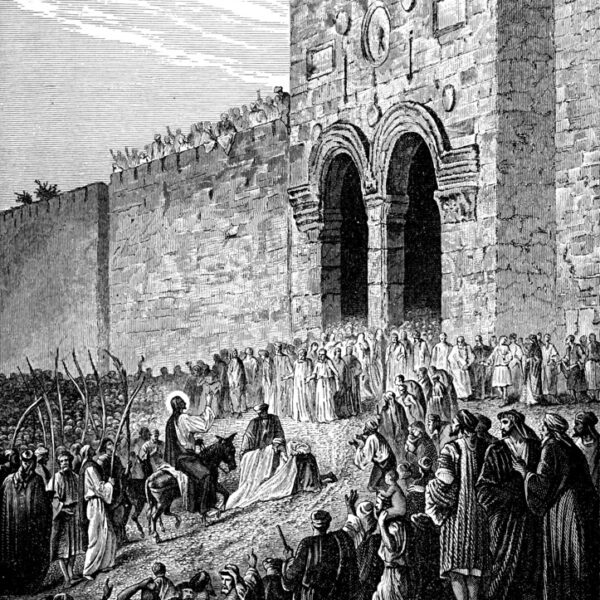Message for Palm Sunday, Year C (4/13/2025)
Philippians 2:5-11 & Luke 19:28-40
I wish the Lectionary Committee had included two more verses at the end of today’s Gospel from Luke. The account of Jesus’ jubilant entry into Jerusalem is more than enough story on its own, of course. He rides the final mile into the city on a colt, fulfilling an old prophecy from Zechariah about a future king who would speak peace to the nations.[1] Jesus’ crowd of followers sings out a verse from Psalm 118: “Blessed is the king who comes in the name of the Lord!” and they lay their garments on the road before him. It’s a rousing spectacle rooted deeply in Israel’s tradition, Israel’s collective memory.
But today’s assigned passage in Luke ends just before Jesus’ famous cry of grief at first sight of the city: “If you, [Jerusalem,] had only recognized on this day the things that make for peace! But now they are hidden from your eyes.”[2]
What does he mean? According to the conventional criteria, it would seem that the ruling elite in Jerusalem know perfectly well the things that make for peace. After all, this is the urban seat of an occupied territory, and representatives of the Roman Empire are quite interested in keeping the peace. So, too, are the local religious authorities willing to preserve a mostly stable, if uneasy, political arrangement. How does Jesus’ notion of peace differ from theirs?
In their book about the last week of Jesus’ life, scholars Marcus Borg and John Dominic Crossan imagine another march into Jerusalem in advance of Passover that fateful year, a procession from the west that looks quite different than the one Jesus leads from the east. Into the city marches Pontius Pilate, the Roman governor of the province of Judea, accompanied by all the trappings of imperial power: war horses, chariots, and infantry, all heavily armed and armored. This parade resembles any and every imperial peacekeeping mission. It’s designed to intimidate anyone inspired by the memory of the people’s liberation at the first Passover, their escape from enslavement in Egypt. Pilate’s march is a clear signal that Rome wields the power to crush any local resistance, so don’t get any ideas.[3] Political domination, military strength, the threat of violence– aren’t these “the things that make for peace”?
But Jesus’ parade incorporates none of the standard symbols of political supremacy. He is not draped in power and escorted by a horde of armed protectors. Instead, his entourage is made up of defenseless, unadorned commoners, and even the animal he rides is on loan. Jesus’ arrival in Jerusalem will not finally be met with adulation, but condemnation; he will not be installed on a throne, but nailed to a cross.
In this way, Jesus’ entry into Jerusalem anticipates the surprising way that God intends to make peace. One interpreter puts it this way:
Jesus rides no high horse, just a lowly colt. He chooses to enter a deadly situation without force or protection. He gives himself freely and without reservation. This is a prophetic act, a sign of God’s vulnerable love, which risks everything and promises to gain all. This is the means by which God creates peace.[4]
Friends, we wave our palm leaves and shout “Hosanna!” to greet a king whose authority does not rest on fear and violence, but faithfulness and sacrificial love. His impulse is not for self-preservation, but for true peace, even at the highest personal cost.
It’s the kind of peace we can’t achieve with more control, more intimidation, more killing, but rather the kind that seeks to transform the violence in our hearts and our policies. The peace of God passes all earthly understanding– all earthly promises of peace that rely on the sword– and instead guards our hearts and our minds in Christ Jesus,[5]
who, though he was in the form of God, did not regard equality with God as something to be exploited, but emptied himself, taking the form of a slave, being born in human likeness. And, being found in human form, he humbled himself and became obedient to the point of death, even death on a cross.
Therefore God also highly exalted him and gave him the name that is above every name, so that at the name of Jesus every knee should bend, in heaven and on Earth and under the earth, and every tongue should confess that Jesus Christ is Lord, to the glory of God the Father.
Hosanna!
[1] 9:9-10.
[2] Luke 19:41-2.
[3] Paraphrased by H. Stephen Shoemaker, in Feasting on the Word, Year C, Vol. 2, 153.
[4] William G. Carter, in Feasting on the Word, Year C, Vol. 2, 156.
[5] Philippians 4:7.
Liturgy © 2022 Augsburg Fortress. All rights reserved. Used by permission under OneLicense # A-706920.
Liturgy © True Vine Music (TrueVinemusic.com). All rights reserved. Used by permission under CCLI license #11177466.
“Lord, You Give the Great Commission”; Text © 1978 and music © 1942, Ren. 1970 Hope Publishing Company, Carol Stream, IL 60188. All rights reserved. Used by permission.
“God’s Work, Out Hands”; Text © 2019 Evangelical Lutheran Church in America, admin. Augsburg Fortress
Music © 1968 Augsburg Publishing House, admin. Augsburg Fortress
“Spirit of Gentleness”; text and music: James K. Manley, b. 1940, © 1978 James K. Manley. All rights reserved. Used by permission under OneLicense #A-706920.
“We All Are One in Mission”; text: Rusty Edwards, b. 1955, © 1986 Hope Publishing Company; music: Finnish folk tune; arr. hymnal version, © 2006 Augsburg Fortress. All rights reserved. Used by permission under OneLicense # A-706920.


